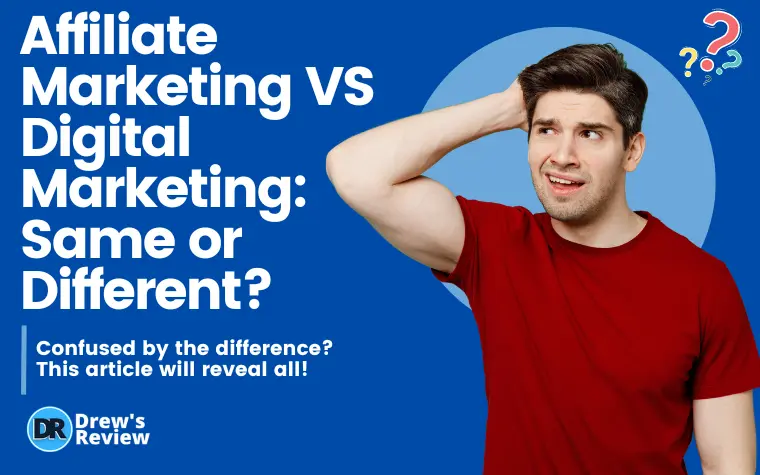
Both affiliate marketing and digital marketing are strategies used in online businesses. But how are they different?
I will explain the differences between the two so you have a clear understanding and which one you might want to use if you are planning to start your own online business.
Key Differences Between Affiliate Marketing VS Digital Marketing
| Category | Affiliate Marketing | Digital Marketing |
|---|---|---|
| Definition | Promoting products of other companies in exchange for a share of the sales. | Marketing through various online channels to sell and promote a company's products. |
| Reach | A subset of digital advertising with a focus on earning commissions through promotions. | Utilizes multiple advertising strategies and is adaptable to various devices. |
| Competencies | Skills in relationship-building and persuasion are crucial. | Requires expertise in SEO, social media, and analytics. |
| Ownership | Involves partnerships to promote and sell products of others in return for a commission. | Product owners have the flexibility to select different channels for promotion. |
| Components | Involves three key players: the affiliate marketer, the customer, and the product owner. | A multifaceted approach that can be complex to master. |
What is Affiliate Marketing?
Affiliate Marketing is the simplest way to make money online. This is because you don't need to create your own product, worry about customer service and you can pretty much do it in any niche market.
The way it works is simple and can be summarized in these steps:
1. Decide on a product you wish to promote
2. Get your affiliate link from the owner of that product or affiliate program
3. Create content that includes your affiliate link
4. When someone clicks your link and buys that product, you will earn a commission.

The best part about affiliate marketing is that you will likely not need to have a business license, you don't need a huge social media following, it's never too late to start affiliate marketing and it's still booming in popularity with new and OG affiliate marketers.
If you are new, the important thing to understand is that there are different ways to do affiliate marketing. Here is how to choose the right course.
Affiliate marketing can be done with a blog, through email marketing, or even through social media including YouTube. The right channel you use really should depend on a mix of your abilities and what interests you.
For example, would you prefer to make videos or write blog posts?
This will be different for everyone so there is no "right way" to do affiliate marketing. It all depends on what you are most comfortable with. Choose that one. You'll have a greater chance of success that way.
What is Digital Marketing?
Digital Marketing is where you use various online-based technologies to promote products and services to your audience.

The goal of digital marketing is to find an audience to deliver products and services to. This can be anything such as pay per click advertising, email, SEO, website advertising, YouTube ads, social media marketing, etc.
Think of digital marketing as a whole and affiliate marketing as a subset of that.
Compared to traditional marketing strategies, digital marketing is often more affordable and cost-effective. Businesses can reach a wider audience with a lower budget, thanks to the targeted nature of digital marketing campaigns.
Another advantage of digital marketing is that it's trackable. businesses have the advantage of being able to track and measure the effectiveness of their marketing efforts, making it easier to optimize and improve their strategies.
11 Differences Between Affiliate Marketing vs Digital Marketing
1. Affiliate Marketing is primarily focused on driving sales or leads for another business, earning a commission for each successful conversion. Digital Marketing is broader in scope and aims to promote a brand, increase engagement, drive traffic, or achieve other marketing goals using various digital channels and strategies.
2. Affiliate marketing mostly involves content marketing with either SEO (ranking on Google), pay-per-click advertising, or email marketing to promote affiliate products. Digital Marketing includes a variety of strategies like SEO, content marketing, social media marketing, email marketing, PPC, etc., not limited to promoting affiliate products.
3. Affiliate marketers are paid based on their performance and always on a commission-based model whether it's per sale or lead. Digital marketers get compensated in many different ways, such as a fixed salary project-based fee, or other ROI metrics.
4. Affiliate marketers primarily use blogging, social media, and PPC ads to promote their affiliate offers. Digital marketers use a broader set of platforms such as social media, search engines, and more.
5. Affiliate marketing usually involves 3 parties - the vendor (advertiser), the publisher (you, the affiliate), and three, the consumer. Digital marketing can involve many stakeholders including marketing teams, agencies, vendors, and consumers.
6. Affiliate marketing is a lot more focused on conversions and direct responses such as making a purchase or clicking a link. On the flip side, digital marketing is a lot more diverse by focusing on brand awareness, engagement, conversions, customer retention, and more.
7. Affiliate marketing has less control over the brand message because affiliates just promote the product and really don't have much influence on how the brand is portrayed. As you can guess, in digital marketing there is a lot more control over the brand message and customer interaction.
8. Affiliate marketers don’t own the products or services they are promoting. In digital marketing, it's usually the owners of the products that conduct the marketing for their own products and services.
9. Affiliate marketers don't have much wiggle room when it comes to creativity and have to abide by the rules of the affiliate. Digital marketing allows for a lot more creativity when it comes to branding and promotion.
10. When it comes to skills, an affiliate marketer needs basic skills like SEO, content creation, and basic and basic knowledge of data analytics and tools. Digital marketers need a broader skill set which includes SEO, social media management, content creation, email marketing, data analytics, a suite of marketing tools, and more.
11. Typically, there is a shorter-term focus on sales and conversions with affiliate marketing as offers can change or affiliates may no longer participate in the program. With digital marketing, there can also be a short or long term focus but this is on goals and brand building.
Final Thoughts on Affiliate Marketing VS. Digital Marketing
As you can tell by now, both affiliate marketing and digital marketing can co-exist in a marketing ecosystem.
But you now know that affiliate marketing is just a component of digital marketing. Companies often use affiliate marketing as one component of their overall digital marketing strategy.
So chances are your focus will be on affiliate marketing rather than digital marketing because you likely don't have your own product. If you had your own product you would employ a digital marketing strategy.
Want to learn affiliate marketing? Check out these top courses!
You might also like...
- Best Ways to Make Passive Income on YouTube - April 15, 2024
- How I Make Faceless YouTube Channels With AI - April 9, 2024
- Top 21 Faceless YouTube Niches to Earn Big Profits in 2024 - April 3, 2024
